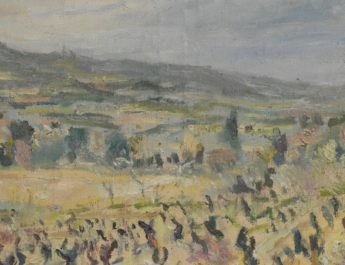Ecclesiastes 1:2, 12-14 & 2:18-23
Ordinary C36
1:2 VanityA of vanities, says the Teacher,B
vanity of vanities! AllC is vanity.
A “vanity” = hebel. This is emptiness, vapor, breath. It can refer to something that is fleeting or futile, worthless or a delusion. Something that is passing and so does not satisfy. This is related to the root for the name “Abel.”
B “Teacher” = Qoheleth. 7x in OT – all in Ecclesiastes. From the same as qahal (assembly, congregation, multitude); from qahal (to gather, convene, assemble like a congregation). This is Qoheleth, meaning “preacher,” “lecturer,” or “teacher.”
C “all” = kol. From kalal (to complete). This is all or every.
12 I, the Teacher, wasD kingE over IsraelF in Jerusalem.G
D “was” = hayah. This is to be, exist.
E “king” = melek. From malak (to be or become king or queen, to rise to the throne, to be crowned; by implication, to take counsel). This is king or royal.
F “Israel” = Yisrael. From sarah (to persist, exert oneself, contend, persevere, wrestle, prevail) + el (God or god). This is Israel, meaning God strives or one who strives with God; new name for Jacob and for his offspring. This refers to the people and to the land.
G “Jerusalem” = Yerushalaim. From yarah (to throw, shoot, be stunned; to flow as water so figuratively to instruct or teach) + shalam (to make amends, to be complete or sound). This is Jerusalem, dwelling of peace.
13 I appliedH my mindI to seekJ and to search outK by wisdomL
H “applied” = natan. This is to give, put, set, offer. It is to give literally or figuratively.
I “mind” = leb. May be related to labab (to encourage; properly, to be encased as with fat; used in a good sense, this means to transport someone with love; used in a bad sense, it can mean to dull one’s senses). This is the heart, courage, one’s inner self, the mind, or the will. Heart is only used in a figurative sense in the Old and New Testaments.
J “seek” = darash. This is seek, ask, inquire, care for. Generally it means following in pursuit or following as part of a search, which implies seeking or asking. Also used specially to mean worship.
K “search out” = tur. This is to seek out, explore, investigate. It is often used of trading or spying.
L “wisdom” = chokmah. From chakam (to be wise or teach wisdom; this is wisdom in thought, word, or action). This is wisdom, wit, or skillfulness.
all that is doneM underN heaven;O it is an unhappyP businessQ
M “is done” = asah. This is to make, do, act, appoint, become in many senses.
N “under” = tachat. This is underneath, below, the bottom, instead of.
O “heaven” = shamayim. Root may mean being lofty. This is sky, the air, or heaven. It is in a dual noun form so this might refer to the part of the sky where the clouds move on the one hand and the part beyond that where the sun, moon, and stars are on the other hand.
P “unhappy” = ra’. From ra’a’ (to be evil, bad, afflict; properly, to spoil – to destroy by breaking into pieces; figuratively, to cause something to be worthless; this is bad in a physical, social, or moral sense; that which displeases, to do harm or mischief, to punish or vex). This is bad, disagreeable, that which causes pain, misery, something having little or no value, something that is ethically bad, wicked, injury, calamity. This refers to anything that is not what it ought to be – a natural disaster, a disfigurement, an injury, a sin.
Q “business” = inyan. 8x in OT– all in Ecclesiastes. From anah (to be busy or occupied with something; also, to be afflicted). This is a task, effort, business, or investment.
that GodR has givenS to humansT to be busyU with.
R “God” = Elohim. Related to “Israel” in v1:12. See note F above.
S “given” = natan. Same as “applied” in v1:13. See note H above.
T “humans” = ben + adam. Literally, “children of humanity.” Ben is from banah (to build or obtain children). This is son, age, child. It is son in a literal or figurative sense. Adam is perhaps from adam (to be red, make ruddy); related to adamah (ground, dirt, earth). This is man, humankind, also Adam’s name. It refers to a human individual or humanity.
U “be busy” = anah. Related to “business” in v1:13. See note Q above.
14 I sawV all the deedsW that are done under the sun,X
V “saw” = raah. This is to see in a literal or figurative sense so stare, advise, think, view.
W “deeds” = maaseh. Related to “is done” in v1:13. From asah (see note M above). This is a word – any action whether positive or negative. It can also be a transaction, construction, activity, property, or something that is produced.
X “sun” = shemesh. This is sun or toward the east. Its root may mean being brilliant. Figuratively, this could be a ray or an arch.
and see,Y all is vanity and a chasing afterZ wind.AA
Y “see” = hinneh. From hen (lo! Behold! If, though; an expression of surprise). This is to draw attention, show suddenness or surprise, or to emphasize the importance of the coming statement. See! Lo! Behold!
Z “chasing after” = reuth. 7x in OT – all in Ecclesiastes. From the same as rea (purpose, thought); from ra’ah (to tend a flock, pasture, or graze; to rule or to associate with someone; figuratively, ruler or teacher); akin to rea (associate, companion, friend, neighbor, or other; close family or a lover). This is feeding on, longing, chasing after.
AA “wind” = ruach. This is breath, wind, air, cool, spirit. This is wind, which resembles the breath and so this can be used figuratively for life itself or being frail/mortal/impermanent. It can refer to the air of the sky or the spirit.
2:18 I hatedBB all my toilCC in which I had toiledDD under the sun, seeing that I must leaveEE it to my successor,FF
BB “hated” = sane. This is to hate, an enemy. It is a personal hatred and not an abstract one.
CC “toil” = amal. From amal (to work – hard labor). This is trouble, toil, labor as well as misery, sorrow, or iniquity. It is work that wearies through effort so hence worry – can refer to body or mind.
DD “toiled” = amel. Related to “toil” in v2:18. 9x in OT. From amal (see note CC above). This is a laborer, one who suffers, wicked. It could also mean sorrowful.
EE “leave” = yanach. Perhaps from the same as nuach (to rest, calm, camp, free, place, remain, satisfy, settle, station, or wait; implies settling down in a literal or figurative sense). This is to lay down, let alone, pacify, cast down, or deposit. It can also mean to allow something or someone to stay.
FF “successor” = adam + hayah + achar. Literally, “the person who will come after me. Adam is the same as “humans” in v1:13. Hayah is the same as “was” in v1:12. See note D above.
19 and who knowsGG whether he will be wiseHH or foolish?II Yet he will be masterJJ of allKK for which I toiledLL and used my wisdomMM under the sun. This also is vanity.
GG “knows” = yada. This is to know, acknowledge, advise, answer, be aware, be acquainted with. Properly, this is to figure something out by seeing. It includes ideas of observation, recognition, and care about something. It can be used causatively for instruction, designation, and punishment.
HH “wise” = chakam. Related to “wisdom” in v1:13. From chakam (see note L above). This is wise, skillful, cunning, or artful.
II “foolish” = sakal. 7x in OT. From sakal (being or acting foolishly, whether intentionally or unintentionally). This is a fool or stupid.
JJ “be master” = shalat. 8x in OT. This is to rule, dominate, govern. It can also mean to bear or permit.
KK {untranslated} = amal. Same as “toil” in v2:18. See note CC above.
LL “toiled” = amal. Related to “toil” and “toiled” in v2:18. 11x in OT. See note C above.
MM “used my wisdom” = chakam. Related to “wisdom” in v1:13 & “wise” in v2:19. See note L above.
20 So I turnedNN and gave my heartOO up to despairPP concerning all the toil of my laborsQQ under the sun, 21 because sometimes oneRR who has toiled with wisdom and knowledgeSS and skillTT
NN “turned” = sabab. This is turning around, going around; to surround, cast, walk, fetch. It is to revolve or border in a literal or figurative sense.
OO “heart” = leb. Same as “mind” in v1:13. See note I above.
PP “gave…up to despair” = yaash. 6x in OT. This is to be desperate, be of no use, be hopeless.
QQ “labors” = amal. Same as “toiled” in v2:19. See note LL above.
RR “one” = adam. Same as “human” in v1:13. See note T above.
SS “knowledge” = daat. Related to “knows” in v2:19. From yada (see note GG above). This is knowledge, unawares, cunning, wittingly.
TT “skill” = kishron. 3x in OT – all in Ecclesiastes. From kasher (to succeed, be right, be acceptable). This is skill, advantage, gain good.
must leaveUU allVV to be enjoyed by anotherWW who did not toil for it. This also is vanity and a greatXX evil.YY
UU “leave” = natan. Same as “applied” in v1:13. See note H above.
VV “all” = cheleq. From chalaq (to be smooth in a figurative sense; can refer to the stones that were part of casting lots – hence, apportion, share, distribute; figuratively, it can also mean to flatter). This is a division, lot, inheritance, legacy, or portion. It can also refer to a smooth tongue.
WW “another” = adam. Same as “human” in v1:13. See note T above.
XX “great” = rab. From rabab (increasing in any aspect whether quantity, authority, size, quality, greatness, etc.). This is abundance, many, elder, exceedingly, great. It refers to abundance of amount, rank, or status.
YY “evil” = ra’. Same as “unhappy” in v1:13. See note P above.
22 What do mortalsZZ getAAA from allBBB the toil and strainCCC, DDD with which they toil under the sun?
ZZ “mortals” = adam. Same as “human” in v1:13. See note T above.
AAA “get” = hava. 6x in OT. This is to breathe, to exist.
BBB “all” = kol. Same as “all” in v1:2. See note C above.
CCC “strain” = rayon. Related to “chasing after” in v1:14. 3x in OT. From the same as rea (see note Z above). This is longing or striving.
DDD {untranslated} = leb. Same as “mind” in v1:13. See note I above.
23 For allEEE their daysFFF are full of pain,GGG and their workHHH is a vexation;III even at nightJJJ their minds do not rest.KKK This also is vanity.
EEE “all” = kol. Same as “all” in v1:2. See note C above.
FFF “days” = yom. Root may mean being hot. This is the day in a literal or figurative sense. It can also mean birth, age, daylight, continually or other references to time.
GGG “full of pain” = makob. 16x in OT. From kaab (being in pain, be sad, grieve, spoil, mar). This is pain, sorrow, or suffering. It can be anguish or affliction.
HHH “work” = inyan. Same as “business” in v1:13. See note Q above.
III “vexation” = ka’as. From ka’as (to be angry, trouble, provoke, spite, grieve, have sorrow). This is vexation or anger.
JJJ “night” = layil. Properly, this refers to light twisting away. It is used for night or midnight. Figuratively, this can mean adversity.
KKK “rest” = shakab. This is to lie down, lodge. It is lying for sleep, sex, or other reasons.
Image credit: “All Dried Up” by Anthony Vicente, 2011.




